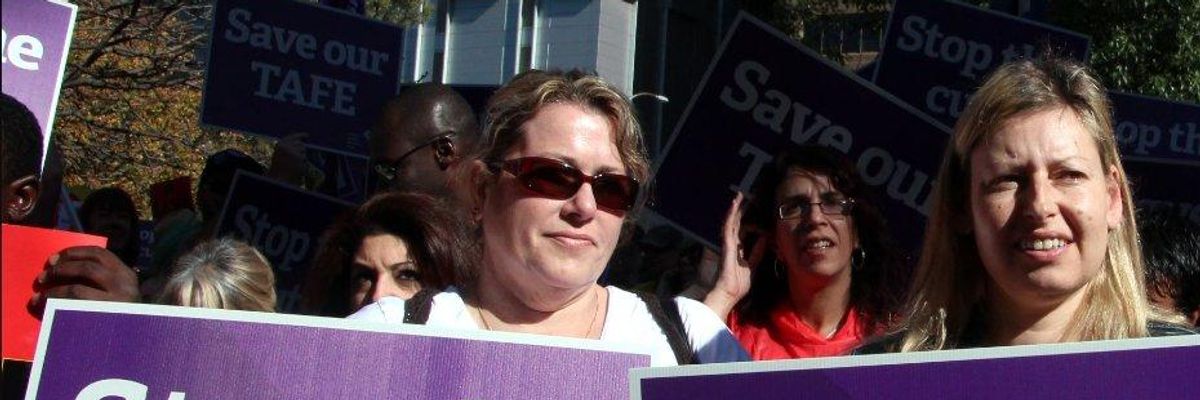The U.S. Supreme Court has just announced its ruling on Janus v American Federation of State, County and Municipal Employees (AFSCME)--not that we were exactly waiting with bated breath. All the smart money was always on a ruling against the union.
The case takes its name for Mark Janus, the federal employee who argues that, as a non-member, being forced to pay the "fair share" dues (less than what a member pays) of the union that negotiates his contract violates his free speech rights because he disagrees with the political positions his union takes. This is despite the fact that fair share dues cannot be spent on a union's political activity.
I come at the case with mixed feelings. I have been the president of a local teachers union, and have often been a critic of my state and national unions. I also taught in a state which is not right-to-work, but where fair share must be negotiated into local contracts. For most of my career, non-union teachers in my district only paid fair share if they chose to.
So when union supporters say that Janus could be a big blow to unions, my first thought is that my co-workers and I lived without fair share for decades. What were the practical effects?
Periodically, members would quit our local union because they were angry about something the state or national union did. I would bet that the majority of my co-workers, like many members of National Education Association (or NEA, the nation's largest union), are Republicans. I'm a Democrat, but NEA's support for Common Core and its early endorsement of Hillary Clinton did not make me feel any warm, fuzzy solidarity for the union.
I've been on the phone with my state president in the past complaining about some of our political choices (Ed Rendell? Really?) at the state level. I can only imagine how the New York state American Federation of Teachers (AFT) members felt when national president Randy Weingarten stepped in at the last minute to do robo-calls supporting Governor Andrew Cuomo's running mate.
Janus represents an acceleration of a pre-existing condition--the decline in union membership.
Of course, only designated contributions to our political action committee go straight to political action, but even so--when the union leaders are out there stumping for a particular candidate or policy, they're still the face of the union and its members. It can be pretty irritating to have someone out there telling everyone what you believe, when you don't actually believe it.
What did we do? What unions have already started working on, because Janus represents an acceleration of a pre-existing condition--the decline in union membership. You combat that by going to your people and making your case. And you conduct yourself like an organization that is going to have to recruit members.
So I am cautiously optimistic that Janus will not be the end of the world. None of which means that I don't see the decision as deeply wrong.
First, by arguing that everything a union does is political, the decision essentially declares that all the work members do is necessarily political as well. This opens the door to all manner of chaos in the workplace and in school.
Second, it invites chaos into the management of a school or other public entity. I've talked to young teachers who support Janus in the case. When I ask them what they propose to do if the next step is to cut them loose--you don't pay dues, you don't get the benefits in the negotiated contract--they feel confident that they can negotiate a better deal for themselves, because the district will be eager to reward their excellence. Oh, honey, aren't you cute.
What school administrator wants to negotiate individual contracts with every single person on staff? What building administrator wants to manage a building in which teachers are all negotiating with the district against each other? I know people in manufacturing management who love their workers' unions because it simplifies dealing with the labor force.
Janus is, of course, part of a larger program to break unions and strip them of the ability to organize. Last year in Pennsylvania, we almost had a "paycheck protection" law that would have prohibited school districts from collecting union dues through payroll deductions--everyone would have had to write a check (a later amended version, narrowed to cover only political contributions, was also beaten back, for now.)
Of course, in the twenty-eight right-to-work states, Janus is just be one tiny additional nail in the coffin that one percenters have crafted for unions. And it's not just about the money--it's about control. It's about the unhampered ability of Captains of Industry to dictate How Things Will Be without having some lowly grunt pop up to get in their way.
It's ironic that between the death of the Friedrichs v California Teachers Association case (which affirmed by a Supreme Court tie the right of unions to charge fair-share fees to non-members) and the judgment of Janus, teachers in states like West Virginia showed that no amount of stacking the deck against them will keep them from organizing if they are so inclined.
Public service unions do more than get folks decent wages. They have been a path to the middle class for minorities in this country. They work most directly with the most vulnerable of our citizens, which means they are an important line of defense for those individuals.
I'm not sure anyone knows to what degree unions will adapt and overcome once they have to. But this much I'm certain of: No systemic improvement in the workplace, no better treatment of workers and the people they serve, was ever put in place voluntarily.




